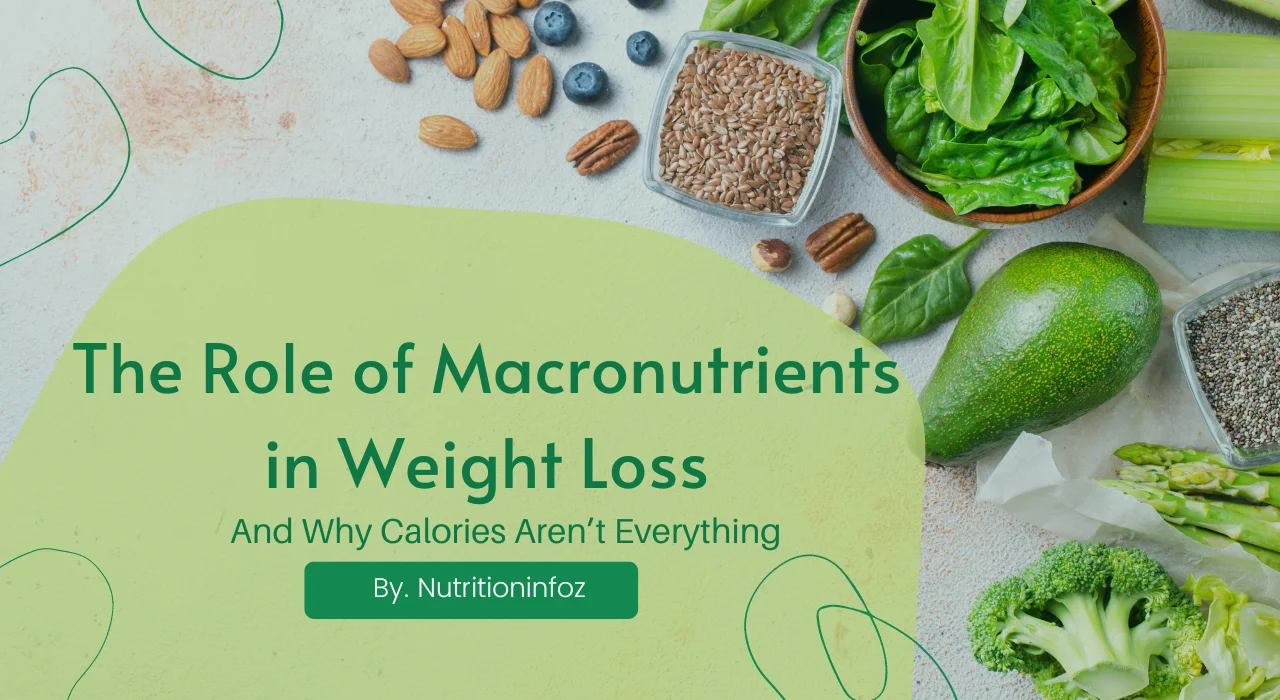Introduction
Calories are spoken about a lot in terms of weight loss. But here lies the rub — calories aren’t everything. Macronutrients are the underrated nutritional giants responsible for how your body burns fat, builds muscle and functions as a whole. Digging deeper into what macronutrients do and why solely counting calories can overlook the forest for the trees.
Understanding Macronutrients
What Are Macronutrients?
Our body needs macro nutrients on a larger amount for proper function. These are carbs, proteins and fats — all of which have a specific role to play in our health and metabolism.
- Carbohydrates: Carbs are usually the enemy in fat loss conversations, yet they are your bodies main source of energy. There are two types of them i.e. complex & simple. Whole grains and vegetables are also important They provide energy for the body to function needed nutrients. The complex carbs in veggies give you steady energy, while a candy bar is a simple carb that gets used up fast, leading to crashes and cravings.
- Proteins:They are what life is made of. Proteins: they are made of amino acids, the building blocks for tissue formation and repair, such as muscles. They are also critical for making enzymes and hormones. It is found in higher amounts in meats, dairy foods and nuts.
- Fats: Fats are needed for hormones and to maintain the structure of every cell in your body. They are saturated, unsaturated and trans fats. • Good fats, like those in avocados and nuts can improve cholesterol levels and also keep you feeling full.
The Importance of Each Macronutrient
Macronutrients have distinct functions in our bodies, and can affect how achieve success in losing weight. We know that calories do matter, but not all calories are created equal and what we consume impacts our metabolic pathways as well as health.
The Role of Carbohydrates in Weight Loss
Complex vs. Simple Carbs
There are good carbs and bad carbs. Whole grains and vegetables contain complex carbs, which digest slowly to supply long-lasting energy and help prevent hunger. Simple carbs are digested rapidly and can cause immediate blood sugar elevations.
How Carbohydrates Affect Metabolism
The body needs these carbohydrates to use as fuel for your workouts and daily activities. That said, simple carbs in very high amounts will contribute to weight gain and metabolic problems. Using complex carbs to balance out other intake can keep a similar pace in overall health and metabolism.
The Impact on Blood Sugar Levels
Carbs have a direct impact on your blood sugar levels, and that changes insulin(insulin levels). Elevated blood sugar spurs fat storage and suppresses appetite. In my case, I try to stick with the right types of carbs that keeps my blood sugar ‘happy’ and crispy cravings at bay.
The Significance of Protein in Weight Management
Protein’s Role in Satiety
Protein in particular, is famed for making us feel fuller faster. Protein levels also suppress hunger and calorie intake throughout the day than lower protein meals, which makes a caloric deficit easier to maintain.
Muscle Maintenance and Growth
Resistance training is essential to prevent muscle loss…and remember, muscle burns more calories at rest than fat! Getting enough protein will help to repair and grow your muscle so that you can stay lean.
How Protein Affects Metabolic Rate
Protein has a higher thermic effect, which means that your body burns more calories digesting it than fats and carbs. Proteins can boost your metabolism and help with weight loss.
The Impact of Fats on Weight Loss
Different Types of Fats
Cheesesaturated, monounsaturated and polyunsaturated are the different forms of fat. The fats that are good for your heart, such as olive oil and those found in fatty fish, but also assist in your bid to lose weight due to their hunger-busting nature. Small quantities of saturated fats, located in animal products and in a few processed foods. The greatest trans fat to devour is zero.
The Role of Healthy Fats
Good fats are important for hormone production and cell health. They also play a role in controlling hunger and promoting good general health. EATING MORE GOOD-FOR-YOU FATS Can Aid Weight Loss And Wellness
How Fats Affect Hormones and Appetite
Hormones are regulated by fats, hormones that control hunger and satiety among others. Sufficient intake of healthy fats can normalize these hormones and decrease the likelihood of overeating, supporting weight loss efforts.
Calories vs. Macronutrients: A Comparative Look
The Caloric Value of Macronutrients
Carbohydrates and proteins provide 4 calories per gram each, whereas fat offers a caloric density of 9 calories per gram. These values will help in preparing well balance meals and maintaining weight.
Why Quality Matters More Than Quantity
And therein lies one of the problems in solely emphasising calories and that is it can lead to reduced levels of certain vitamins and minerals and potentially poorer health. Focusing on the quality of your macros — like whole foods vs. processed options — will promote better health and greater long-term weight loss.
Understanding Nutrient Density
Nutrient-dense foods are those which contain many vitamins and minerals relative to their calorie content. Focus on nutrient-dense foods and make sure you get enough of your daily dose of essential nutrients while also keeping an eye on calorie intake.

The Metabolic Impact of Macronutrient Ratios
Low-Carb, High-Protein Diets
High-protein, low-carb diets may also help you lose weight more quickly by reducing your appetite and boosting or slowing down fat-burning. Though, it may not be the preferable drink for everyone and needs to be advised with respect to the body features.
High-Carb, Low-Fat Diets
Create trade off — Eating less fat means we add the same amount of something else! And that allows companies to have a field day creating whatever new food like Low Fat cookies, Ice cream and just anything Harvest Bars, Morning Lite Weet-Bix (not even whole grains) which are heavily processed or long-preserving and often contain significantly more sugars than before. While this approach can work for some people, eating that many eggs might require careful planning to get enough protein and healthy fat.
Balancing Macronutrients for Optimal Weight Loss
The individual needs of macronutrients balance vary by personal goals, preferences, and metabolic needs. Trying to see what works for your body the best and helps release fat can be trial and error, but at least experimenting with various ratios should get you on the right weight loss track.
Common Misconceptions About Macronutrients and Weight Loss
“All Carbs are Bad”
Carbohydrates that do no harm Whole grains are a necessary part of a well-balanced diet and can help you lose weight, so long as you watch your portions.
“Fats Will Make You Fat”
Like general health and weight management, healthy fats play a crucial part. You need to educate yourself on good and bad fats and find ways to include them in your diet without negatively affecting your health.
“Protein is Only for Bodybuilders”
Protein is little restricted to only bodybuilders. This makes it great for muscle: repair, fullness and general health, including your diet.
Practical Tips for Managing Macronutrients
How to Calculate Your Macronutrient Needs
To truly assess what your macronutrient needs are, you first need to calculate your total daily energy expenditure (TDEE) and then make adjustments according to whatever goal you have relative to weight loss. There are online calculators and nutritional guidance that can assist with this process.
Tips for Tracking Macronutrients
Count macros: There are many different apps and food diaries that will help you track your macronutrients. On the other hand, this can also help you if you are coming up short and do not realize it because paying attention to portion sizes or food labels can be an eye-opener.
Balancing Macronutrients in Everyday Meals
To assure this balance and satisfaction, each meal should include a combination of macronutrients. So a plate that consists of protein, grains, and fats for instance is good balance.
Case Studies and Success Stories
Real-Life Examples of Macronutrient-Based Weight Loss
Through the use of macronutrient balance, rather than relying exclusively on calorie counting, many people have found significant success in their weight loss efforts. These examples help to indicate how a more comprehensive diet can make all the difference in this world.
Lessons Learned from Successful Diet Plans
Many of the best diet plans stress the importance of macronutrient ratios and are customized to each individual person. These plans will provide a good perspective of what you can learn to manage your own weight.
The Role of Exercise in Macronutrient Utilization
How Exercise Affects Macronutrient Needs
Carbohydrates, proteins & fats are needed more because of the energy demand, muscle repair and performance expended from physically activities. Fine-tuning macronutrient ratios to fit your activity levels can make a big difference in terms of results.
Combining Diet and Exercise for Best Results
The cornerstone of such effort, however, must be a proper diet and pretty vigorous exercise if long-term weight loss success is to be obtained. Guess what — adjusting the macronutrient ratios to better support your fitness goals can, in fact, maximize results.
Adapting Macronutrient Ratios to Individual Needs
Personalizing Your Diet Based on Goals
By customizing your macronutrient ratios to fit with your personal goal (muscle gain, fat loss, or maintenance) you make it a sustainable diet for interpreting your previous eating habits.
Considering Lifestyle and Activity Level
However, your lifestyle and activity level will dictate the macronutrient balance that is best for you. Likewise, someone who is constantly on-the-go may need more carbs for energy than someone who sits at a desk all day.
For information about Nutrition Types Click Here
Challenges and Considerations
Dealing with Dietary Restrictions
If you have food allergies or intolerances, it is very important when managing macronutrients that foods are not eliminated without careful meal planning to assure all nutrient needs are being met.
Balancing Macronutrients on a Budget
Consuming a healthy diet does not need to be pricey. By planning meals and using some of the cost-effective sources of macronutrients, it is possible to achieve a healthy balance without completely spinning out our poverty stricken grocery budgets.
Conclusion
In summary, While calories are always a factor in weight loss, macronutrients have a huge influence on your health and metabolism. Knowing what these macronutrients do and striking the right balance between carbohydrates, proteins, and fats with regard to your body specifically will lead to better results in sustained weight loss. What you eat is important but so too is the amount in which it fills you up because good nutrition will also set the foundation in place to help promote fat loss. For More info Click Here
FAQs
- What is the ideal macronutrient ratio for weight loss?
The perfect ratio fluctuates by person however continuously ranges round 40% carbs, 30% protein, and 30% fats. Play around with various ratios to see which one fits you the best.
- Can I lose weight without tracking macronutrients?
It is possible to get lean without tracking macronutrients, but knowledge and control are keys when it comes to getting optimal results and alleviating overall health.
- How do macronutrients affect my energy levels?
Protein is important for producing energy and body building, while carbohydrates are short-term fuel providers and fats store long term running energy. Keeping this balance can help maintain even energy supply throughout the day.
- Are there any risks to focusing too much on macronutrients?
An overemphasis on macronutrients result in calorie manipulation and eating unhealthy fats. However, overall nutritional balance is key.
- What are the best sources of each macronutrient?
- Carbohydrates: Any whole grain and fruit or veggie.
- Proteins: Lean meats, fish, legumes and dairy.
- Healthy Fats: Avocado, nuts, seeds and olive oil.




Leave feedback about this